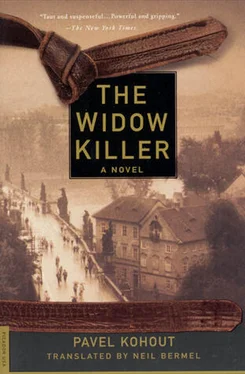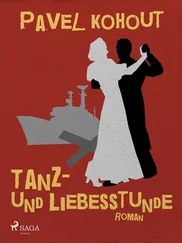Pavel Kohout - The Widow Killer
Здесь есть возможность читать онлайн «Pavel Kohout - The Widow Killer» весь текст электронной книги совершенно бесплатно (целиком полную версию без сокращений). В некоторых случаях можно слушать аудио, скачать через торрент в формате fb2 и присутствует краткое содержание. Год выпуска: 2007, Издательство: St. Martin's Press, Жанр: Современная проза, на английском языке. Описание произведения, (предисловие) а так же отзывы посетителей доступны на портале библиотеки ЛибКат.
- Название:The Widow Killer
- Автор:
- Издательство:St. Martin's Press
- Жанр:
- Год:2007
- ISBN:нет данных
- Рейтинг книги:5 / 5. Голосов: 1
-
Избранное:Добавить в избранное
- Отзывы:
-
Ваша оценка:
- 100
- 1
- 2
- 3
- 4
- 5
The Widow Killer: краткое содержание, описание и аннотация
Предлагаем к чтению аннотацию, описание, краткое содержание или предисловие (зависит от того, что написал сам автор книги «The Widow Killer»). Если вы не нашли необходимую информацию о книге — напишите в комментариях, мы постараемся отыскать её.
The Widow Killer — читать онлайн бесплатно полную книгу (весь текст) целиком
Ниже представлен текст книги, разбитый по страницам. Система сохранения места последней прочитанной страницы, позволяет с удобством читать онлайн бесплатно книгу «The Widow Killer», без необходимости каждый раз заново искать на чём Вы остановились. Поставьте закладку, и сможете в любой момент перейти на страницу, на которой закончили чтение.
Интервал:
Закладка:
“What’s wrong? Aren’t you pleased I’ve decided to sleep only with you?”
“You know I am!”
She let the bath sheet drop past her chest and hips.
“So then, love, what are you waiting for?”
Two hours later, she was resting again in utter self-surrender, her head on his “wing,” as she called his shoulder, her right leg beneath his knees and her left on his belly. In this tangle of limbs, she began to describe how she and Meckerle had met. She’d recuperated a bit in Berlin after that horrible retreat through Prussia… but she didn’t want to and wasn’t going to talk about that. Through connections she’d gotten herself assigned to peaceful Prague. After her first appearance in the German Theater’s troupe, two Viennese petty officers were waiting for her afterward by the back door, offering her an evening out. She had already learned from her colleagues who the master of Prague was. They would have to ask Colonel Meckerle, she told the two of them with a frosty smile and they disappeared into the darkness.
She used the same answer on subsequent days to more and more new suitors. Theater fans followed the troupe’s membership closely, and apparently she was unmissable. As interest rose so did ranks; soon she was rebuffing generals’ aides-de-camp with the same line. As she had anticipated, she said cheerfully to Buback, a month later Meckerle personally appeared in the auditorium. During the intermission, she— and not the soloists of the Magic Flute —was invited secretly to his box so he could ask her if it was true she had linked herself to him.
She asked for his pardon; having lived through war and personal hell in the East, she wanted to stay clear of these heartless meddlers, she said. The imperial protector and the state secretary did not look like the type to have mistresses, so she had decided unilaterally to put herself under the protection of the third most powerful man in the Protectorate. That swelled his head a bit, of course, and not only his head, she laughed gruffly. When she guiltily promised him that she’d stop immediately, he relented and gave her permission to continue.
Then she cut off the confidences until, as she said, he was in rut. On principle, she refused to meet with him in his apartment or a hotel, because she knew full well that he absolutely could not visit her in the German artists’ dormitory. Anyway, she hated the place, because living there marked her as just another a dime-a-dozen troupe member. It was true, though, she admitted to Buback; she was a dancer, had never studied singing, and still did not know how to read music. She had been accepted into the first troupe for Martin’s sake, so she could accompany him. Only later did it become clear that she had more talent than many of the trained singers.
She had correctly calculated, she continued during her next cigarette — which she managed to find, settle in its holder, light, and tap on the rim of an empty glass without changing position — that here in Prague, only Meckerle could raise her from the abyss to the heights she’d scaled five years earlier with Martin in Berlin. Once again she would be admired and envied for catching the biggest fish in the pond (then, a star of the stage; now, a warlord).
Meckerle, she said, returning immediately to the story, procured a suitable apartment for her as she had expected. To thank him, she presented him there with a feast for the senses. Not a real one, of course, but a perfect replica, she assured Buback, as if this would comfort him. She’d done it so that, for once in his life, he’d have some inkling of what it could be like. After that he would have to get there on his own. Did Buback understand?
She finished her cigarette, wound her slender hands about his head, and kissed him passionately again. He was happy to hold her, but her merciless tale had been depressingly similar to Meckerle’s. For the first time since he had known her — for the first time in his life, really — he felt he was about to explode. She really was a better sort of whore! But then for God’s sake, why had she chosen him?
He knew that if he asked, she would be packed and gone in five minutes, never to return, and the emptiness that would remain after her flooded over him almost physically.
Only a bullet could fill that gap.
He swallowed his shout so forcibly that his Adam’s apple must have moved. Instead, he asked a question.
“So why risk his anger now?”
“First of all, there won’t be any,” she announced convincingly. “You should have realized that today. He knows he got what he deserved. Most likely he’s hoping that he’ll win me back. And second? Figure it out for yourself, Buback; you have a splendid imagination in bed, but in other areas it’s sadly lacking. Use the opportunity while it lasts.”
An hour later she was again lying blessedly in his arms. She still could not sleep and would not let him drift off either.
“Now it’s your turn to talk,” she ordered him, “but not about women. I don’t want to hear that you’ve ever had anyone else.”
“But you—” he finally objected.
“I want you to know me as I am,” she interrupted.
“So then why do you refuse to know me?”
“Why, why, why! Why don’t you tell me what you do? As a child I thought policemen protected the world. So what do you protect now that the world’s coming to an end?”
His work was the one thing that had always upset Hilde. She was constantly afraid for him, and they had tacitly agreed he would not speak about it to her. Now he tried, and surprised himself: His description of the case of the widow killer was brief and dramatic. Grete even sat up in excitement, hugged her knees with her elbows, and propped her childlike breasts on them (for a week now she had insisted that with his help they were finally starting to grow). She was listening so intently that she even forgot to light another cigarette.
When he finished the most recent episode, in which Beran’s secretary insisted on serving as the decoy, Grete asked, “Is she your lotus flower?”
“Please don’t get angry again,” he pleaded panicking.
“I’m not angry. It’s an act of womanly solidarity. And I’m surprised you didn’t offer me the chance.”
“Where did that come from?”
“She’s helping her fiance; why can’t I help you, love? I’ll never make a good wife, let alone a good widow, but surely I can play one as well as your little goddess, don’t you think? But you’ll have to let me go to
sleep earlier. Not tonight, though; not tonight. . Remember how that
first morning you asked me what had happened? Well, here’s what it was: Your sex touched my soul.”
Morava was getting to know a new Jitka. Where had that touching shyness gone that made him long to protect her unto death? Now he could only see it in her as she slept. It was as if incipient motherhood had brought out features rooted deep in her bloodline, which had survived centuries of catastrophes wreaked by mankind and nature in that wide-open land.
He often felt that despite his enthusiastic embrace of city life, he was still a part of that natural landscape, even though he had only spent his childhood there. At certain points, especially crises, he found an inner strength that was not his own. Then he would always remember the strange exhilaration he had felt at his grandfather’s and father’s deathbeds. Even today he did not dare to express it — it seemed too odd — but he believed that at the time some immortal part of their being had passed over to him.
The family smithy, as renovations revealed, had burned down at least twice during the Swedish or Turkish wars. Even the anvil was no more than fifty years old. No one knew where the previous ones had gone, along with the bones of all the local blacksmiths, since only the last three Moravas rested in the town cemetery. Once, while digging, they found a horseshoe, which might have hung over the entrance at some point. It appeared to bear the date 1621 (a tragic year for the Bohemian and Moravian nations), thus proving the existence of at least thirteen generations of blacksmiths on that spot.
Читать дальшеИнтервал:
Закладка:
Похожие книги на «The Widow Killer»
Представляем Вашему вниманию похожие книги на «The Widow Killer» списком для выбора. Мы отобрали схожую по названию и смыслу литературу в надежде предоставить читателям больше вариантов отыскать новые, интересные, ещё непрочитанные произведения.
Обсуждение, отзывы о книге «The Widow Killer» и просто собственные мнения читателей. Оставьте ваши комментарии, напишите, что Вы думаете о произведении, его смысле или главных героях. Укажите что конкретно понравилось, а что нет, и почему Вы так считаете.












